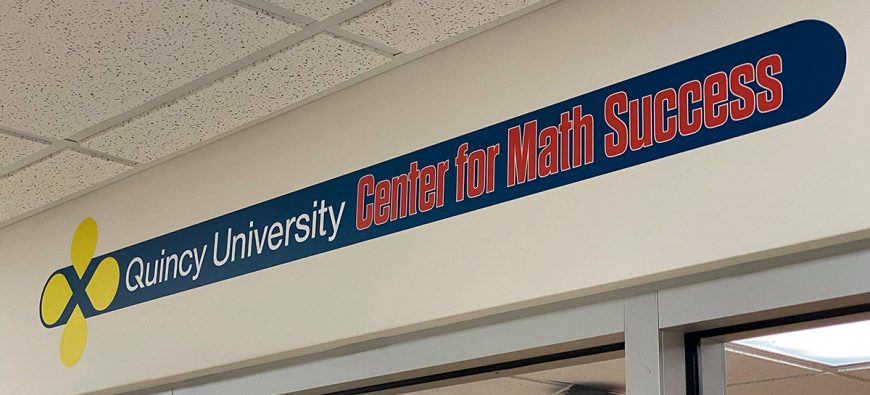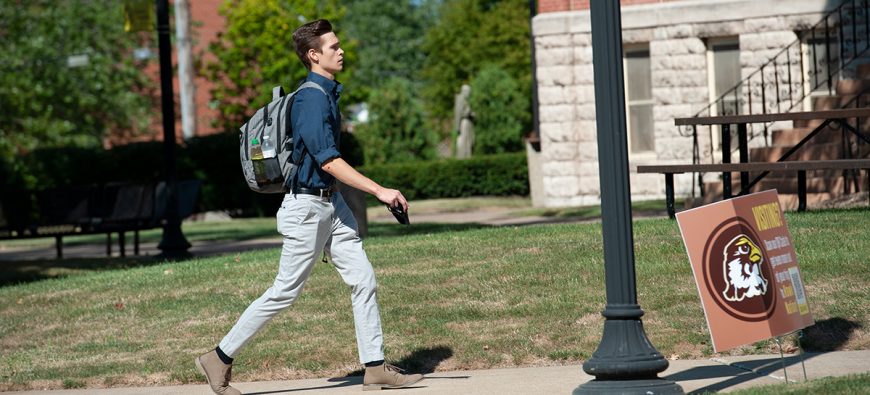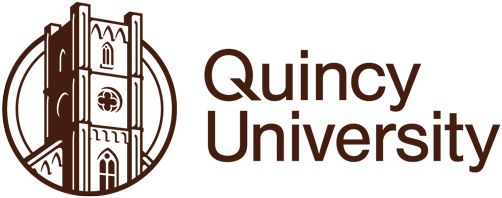
The study of developmental math education is of great importance in the United States, where students continue to lag behind the rest of the world in math performance. Studies have shown the use of technology can positively impact the performance of developmental math students
One study shows that postsecondary students participating in technology-assisted intervention passed math courses at a 50% higher rate than comparable prior students who did not experience the intervention
The new MAT101 course designed for Quincy University’s Math Success program utilizes ALEKS (Assessment and Learning in Knowledge Spaces), an adaptive learning software that allows students to progress through coursework at their own pace, as they reach proficiency in core concepts. Students participate in coursework in a new math lab supervised by the Math Success Coordinator, Dr. Nathan Averbeck.
It is widely understood that math anxiety plays a strong role in math performance. Several strategies for easing postsecondary student anxiety around mathematics are supported by the literature including the use of math manipulatives and training in self-regulated learning.

These are two of the strategies that will be employed in the Math Success program through individualized, one-on-one coaching by carefully trained peer tutors in the Math Collaboration Room.
The Math Success program is designed to bolster the math pathway through Calculus II. A large body of research supports active learning as most the most effective teaching strategy, especially for developmental math students.
Active learning is a process whereby students engage in activities such as reading, writing, discussion, or problem solving that promote analysis, synthesis, and evaluation of class content. Cooperative learning, problem-based learning, and the use of case methods and simulations are some approaches that promote active learning. All math faculty members have incorporated active learning strategies and tactics into their courses conducted in the Math Active Learning Classrooms on North Campus.
Dr. Nathan Averbeck
Title III Coordinator of Math Success
Degrees/educational institutions:
PhD math (Baylor), MA math (Eastern Illinois), BS math (Cedarville)
Previous relevant experience:
Over the past decade, I have taught many math classes in the traditional format, and prior to that, I spent much of my time tutoring. Recently, I have taught college algebra with ALEKS, which is a computer program that assesses the individual needs of students, customizes their immediate learning objectives, and re-assesses their knowledge as they progress–in other words, ALEKS shows students what they know and helps them know what to work on next. I have also recently taught classes in which students explain homework problems to the rest of the class or engage in in-class activities (such as electing a class president or fairly dividing a pile of candy).
What are you most looking forward to in your new Title III role?
I am most looking forward to getting to know the peer tutors and equipping them as they seek to aid their fellow students. I will be on the lookout to recruit tutors who enjoy the material, communicate clearly, and have a heart for serving, and I will be anxious to help them develop in any way I can.
What can students hope to gain from improvements made by Title III in the area you coordinate?
First, we will be taking a long look at what current research says about how students learn math best and putting those findings into practice. With these findings in mind, we will be developing a tutor-training program and incorporating active-learning strategies in foundational math classes. (We intend for students in these classes to be fully engaged in the process, not just learning by listening.) Finally, we will be doing some remodeling on campus to create an active-learning classroom and to give math students a place to collaborate.
